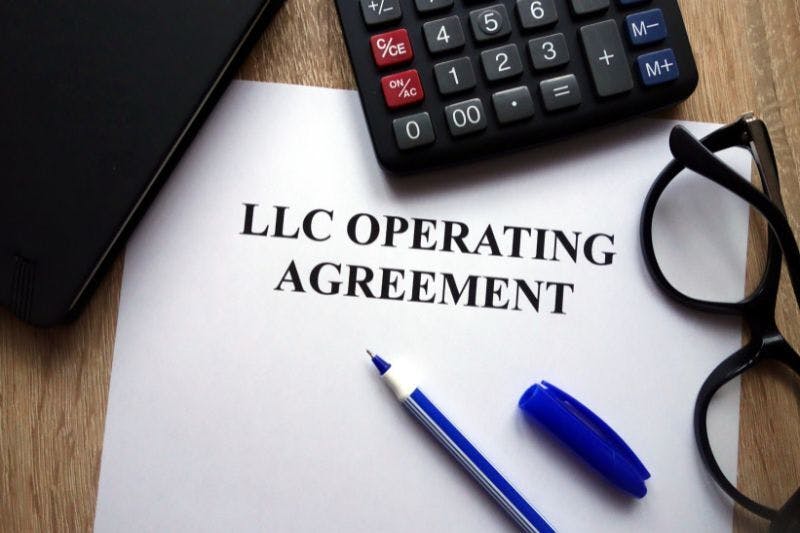
Are you starting an online business or currently running one as a sole proprietor?
If so, then you should consider forming an LLC, especially if you’re concerned with limiting your personal liability.
LLCs can be used to run almost any size and type of business, including an online business.
And in case you’re still hesitating to start an LLC for an online business, consider these advantages that an LLC offers you. But before we start, let’s quickly learn the basics of LLCs.
What is an LLC?
A limited liability company (LLC) is a type of business entity that protect its owners from personal responsibility for its liabilities or debts.
In this business structure, members typically participate in the management of the business except when they choose an alternative management structure referred to as “manager management.”
Such is a structure where designated members are given the responsibility to run the business.
LLC vs. Corporation
Both LLCs and corporations provide their owners with limited liability. However, LLCs are ordinarily taxed like partnerships or sole proprietorships. LLC owners likewise don’t work as employees of the LLC but are considered as self-employed business owners.
On the other hand, there are corporate shareholders working for the corporation. These shareholders are treated like employees of the corporation. For tax purposes, corporations are separate taxpaying entities.
For more information on how to calculate tax liability, check out this post on How to Calculate Tax Liability as a C-Corp.

Courtesy: Pexels
What are the Benefits of a Limited Liability Company (LLC) for Online Business?
Personal Liability Protection
Forming an LLC can shield you from personal liability if you own an online business. This protects your home, investments, car, and other assets in the event that your online business defaults on a loan or is sued.
However, there is an exception to this rule, and that is when you sign a personal guarantee for your online business financing. Such gives creditors the right to hold you personally responsible for paying the loan.
Moreover, you may be held accountable if there’s negligence or fraud causing harm to other parties involved.
Flexibility in Ownership and Management
An LLC structure enables members to decide how profits are shared. If you compare it with a general partnership, all partners split the business profits equally.
With LLC, the profits can be shared based on the terms of the LLC operating agreement. One member who invested more money or put in more effort in bringing the business to fruition may have a larger share of the business profits.
There’s likewise no limitation on the number of owners in an LLC. There’s no requirement, like a set of officers or a board of directors, a corporation would.
Favorable Tax Treatment
LLCs enjoy more favorable tax flexibility compared to sole proprietorships. LLC owners may opt to have their business taxed as a sole proprietorship, C-Corporation, an S-Corporation, or a partnership.
If you opted for your business to be taxed as a corporation, there would be significant advantages, like avoiding payment of income tax on future profits.
This is advantageous for online businesses, which usually have fluctuating income levels and may benefit from electing the most advantageous tax structure.
Credibility and Professionalism
Forming an LLC to own and run your online business gives you credibility, reassuring your clients or customers that you have a real business. Moreover, you’ll have an official online business name to use.
Easy to Transfer Ownership
When your online business grows, it could be necessary to bring new members and transfer ownership. LLCs make the process easier, which is beneficial for entrepreneurs when scaling their operations.
Appropriate for Individuals
LLC benefits don’t only apply to multi-member firms but to individuals too. They can opt for a single-member LLC and still get the benefit of having more flexibility in the way they are taxed and get personal asset protection.

Courtesy: Canva/ Getty Images
How to Start an LLC for an Online Business in 8 Steps
Starting an LLC is relatively easy. Here are the steps to do so:
Step 1. Determine the Location of Your LLC
Let’s say you’ve already chosen the LLC business structure. So, the first step you’ll do is to determine the location of where your LLC will be established.
Usually, for smaller businesses, it’s better to form an LLC in the state where the owner lives to avoid the additional costs of hiring a registered agent in a different state.
Should You Form Your LLC in Your Home State?
You can. In fact, it is the traditional move for many small businesses because the process is straightforward and simple. You also avoid recurring and unnecessary fees from another state where you don’t live.
On the other hand, this move may not be ideal if you’re not a US resident because you won’t have a home or an anchor state.
You may benefit from forming an LLC in another state instead, especially if you own a rental property in different states or you’re a real estate investor. Lastly, you can form your LLC in another state if you want to keep your personal information out of the public eye.
Best States to Form an LLC for an Internet Business
- Alaska - It offers various loan programs for LLCs registered there. Such makes it one of the best states for LLC formation because you can easily secure a business loan. A downside, however, is it requires you to have a physical address in Alaska to qualify for the business loans.
Still, there are other advantages to forming your LLC in this state, including tax credits, depending on your business industry. Some industries that qualify for tax credits include those in new area development, veteran employment, and education.
- Delaware - Delaware does not tax out-of-state business income. Moreover, many businesses love the state because it has the most business-friendly jurisdiction. This is why more than 665 of Fortune 500 companies have formed their businesses here.
Delaware's initial filing fees and franchise taxes are also lower than in other states.
- Nevada - This state is one of your best bets if you’re on a tight budget and want to wave annual fees. Nevada won’t require your online business to pay income tax, franchise tax, state income tax, or corporate tax per year.
Plus, you won’t have a problem with privacy when you register in Nevada because it does not have an information-sharing agreement with the Internal Revenue Service (IRS).
- South Dakota - An advantage of forming an LLC for an internet business in this state is it offers a 0% corporate tax rate.
This is a great option for those considering an LLC that gets taxed as a corporation. It has other tax benefits, such as no inheritance tax, no personal property taxes, and no business inventory tax.
- Wyoming - This is another state with rules aiming to be business-friendly. They don’t impose strict reporting requirements on business owners. They don’t charge personal income tax either.
A unique thing about this state is it offers a lifetime proxy, meaning you can appoint another individual to represent your stock or shares in a company on your behalf. With this setup, it offers business owners the benefit of complete anonymity.
Step 2. Choose Your Business Name
Second of all, choose your online business name. Some things you should keep in mind are the following:
Pick a name that represents you ad your brand
The business name should be easy to remember
Choose a business name with an available matching domain name. This will be the website for your business.
Choose a name that complies with state laws, so your registration documents will easily be processed and accepted.
Each state has different laws in naming an LLC. Some words are prohibited in one state but are not in another state. However, usually, words that are considered obscene, profane, or those that may mislead the public about the nature of the business are not allowed.
Step 3. Set up Your Finances
Next, set up your finances in such a way that separates your personal assets from business profits. As such, obtain an Employer Identification Number (EIN) from the Internal Revenue Service.
EIN will be used to open a business bank account
The EIN will serve as your LLC’s identification number, which will be used to open a company credit card and business bank account, as well as file for unemployment taxes when hiring employees.

Courtesy: Pexels
Step 4. Designate a Registered Agent
When you form an LLC and conduct business, it’s important to list a registered agent. Such a person or entity you have appointed will handle government, legal, and tax correspondence about your business.
Another purpose of a registered agent is to ensure your online business receives time-sensitive and essential information. In the event your business is subpoenaed or sued, the opposing party will likewise send notices to the agent.
You can list yourself as the registered agent of your online business, although it may post issues if you’re not present at the physical location you listed during business hours or if you work from a different physical location as listed.
Step 5. Create your Articles of Incorporation
Draft your articles of organization. You may want to ask the opinion of a lawyer for this or personally find forms at your Department of State Division of Corporation or Secretary of State.
Each state has unique requisites for the articles of organization. Yet, generally, it would need you to state the business name of the LLC and have a statement of purpose. You also need to put the length of time your online business will operate, which you can put as a “perpetual duration statement.”
Other details you have to include are how the business will be managed and what will be the principal place of business.
Step 6. Draft Your LLC Operating Agreement
An LLC operating agreement customizes the terms of your company according to the needs of the LLC members and details the functional and financial decision-making in a structured manner.
This is where you also outline the responsibilities and membership stakes of each member. Delaware, New York, and California require operating agreements, yet not all states do. Check your state’s regulations to be sure, and even if not required by law, it’s helpful to organize your LLC with such an agreement.
The Operating Agreement for an LLC should detail the following:
Appointment of officers
LLC management
Voting powers
Meeting procedures
Regulations on LLC interest fund transfer
How profits and losses are divided among LLC members
Dissolution procedures
Step 7. Apply for Business Licenses or Permits
The next step is to apply for a business license or permit. But first, check the federal, state, or city requirements, as they may differ depending on your activity.
If your state doesn’t have business licenses specifically for e-commerce businesses, then you may apply for a general business license. Meanwhile, you may need a sales permit or a seller's permit to sell online in another state.
Moreover, you may have to apply for a home occupation permit to run a home-based business.
If you plan to sell products online, you may have to pay sales tax on every item sold, depending on your state. With that, you may have to register for sales tax.
Step 8. Set up Your Website
For the last step, create a website on your own or hire a professional to help you. But if your business focuses on more important tasks, you can always let a professional set up your website.
Other Things to Consider When Setting Up an LLC for Online Business
You’ll want to consider the following when setting up an LLC for your online business
Hiring a professional or doing it yourself - You can set up an LLC by yourself, in most cases. There are sample articles of organization that you can check to create your own. Yet, hiring a professional is the ideal choice, especially if you’re planning to form an S-Corp. The professional will ensure you file the right paperwork on time.
Publishing a Notice of Intent - You may have to let the public know by publication weeks or months before you form an LLC. See if this is required for your online business by checking your state laws.
Do a detailed search - Do thorough research online on your target business name to avoid issues.

Courtesy: Pexels
People Also Ask: FAQs About LLC for Online Business
Can I have multiple online businesses under one LLC?
Yes, you can have multiple online businesses under one LLC by either registering DBAs – “doing business as” also referred to as Fictitious Names – or running all business activities in one LLC name.
What is the biggest disadvantage of an LLC?
Personal liability protection offered by an LLC has limitations, like when there’s fraud or corporate misconduct.
And since the members and the LLC are distinct personalities or entities under the law, the financial aspect is separate too.
Why is LLC important for small businesses?
LLCs are fairly easy to form in comparison to C- and S-corps. You may not need the service of a lawyer to form an LLC. And with tax flexibility, you can change the way your LLC is taxed to best serves the members and the business.
What is the advantage of LLC in business?
There are many benefits of forming a limited liability company. One of the most important benefits of operating as an LLC is that the member's assets are protected against the LLC’s debts and obligations.
Furthermore, some states have business-friendly regulations and subsidized tax laws. LLC’s gains, income, losses, credits, deductions, and tax items flow through the member or member.
The Bottom Line
Running a successful online business involves more than finding clients and selling profits. It’s likewise necessary to give attention to the administrative side of things, such as starting an LLC for your online business.
We hope the guide we shared above has helped you understand the advantages of an LLC and how forming one is easy.
Once you form your LLC, your bookkeeping and tax needs will be your next concern. Hall Accounting Company specializes in these services for small businesses, making it easy for you to do what you love while we take care of the rest.
Our team provides custom accounting solutions, such as bookkeeping, annual tax returns, tax planning, payroll, invoicing and receivables collection, and more. Schedule a Call today.
Read More: